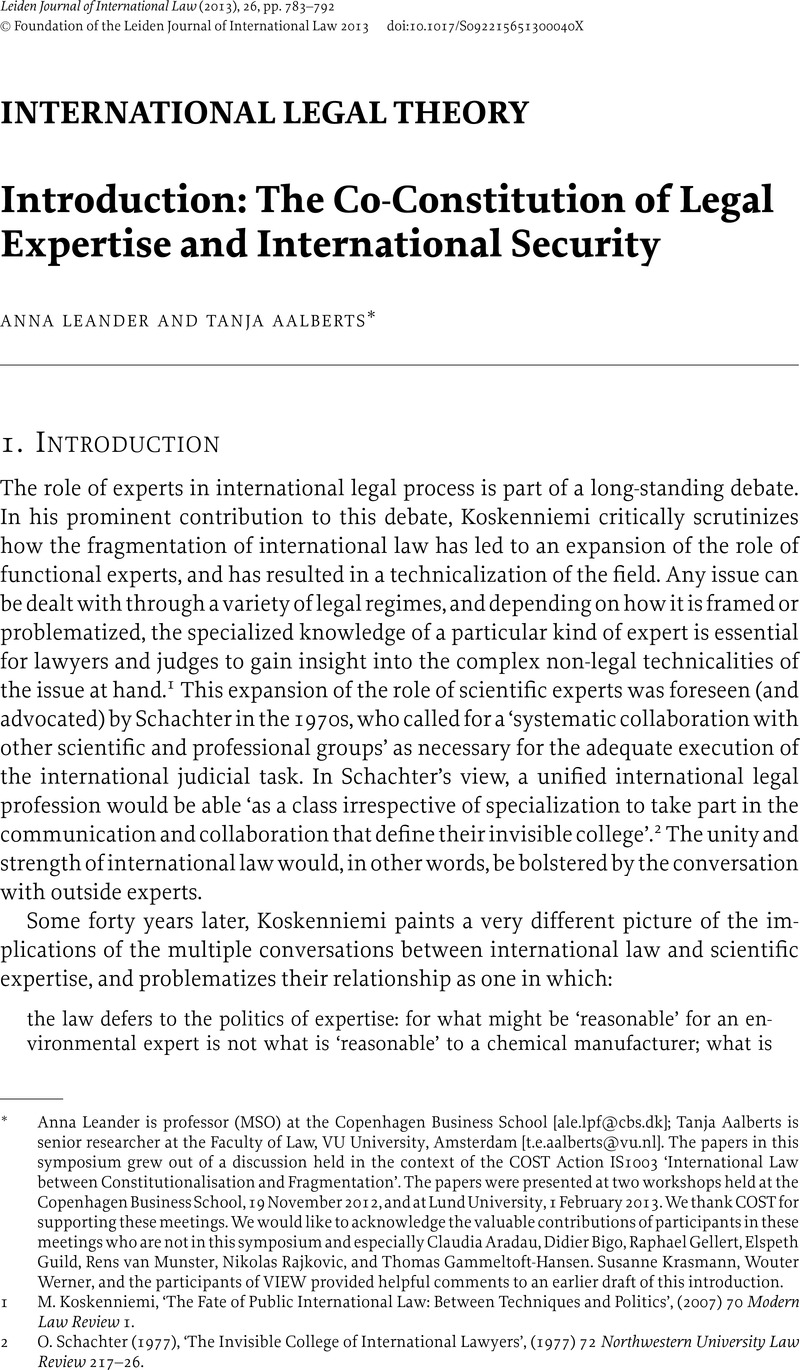Published online by Cambridge University Press: 08 November 2013

1 Koskenniemi, M., ‘The Fate of Public International Law: Between Techniques and Politics’, (2007) 70 Modern Law Review 1CrossRefGoogle Scholar.
2 Schachter, O. (1977), ‘The Invisible College of International Lawyers’, (1977) 72 Northwestern University Law Review 217–26Google Scholar.
3 Koskenniemi, supra note 1, at 10.
4 COST Action IS1003 research seminar ‘Irrelevant, Advisors or Decision-Makers? The Role of “Experts” in International Decision-Making’, organized by the Erasmus School of Law in Rotterdam, 24–5 June 2011. This conference also was one of the triggers for the current symposium.
5 For example Schudson, M., ‘The Trouble with Experts – and Why Democracies Need Them’, (2006) 35 Theory and Society 491, at 496CrossRefGoogle Scholar; and Tillers, P., ‘Introduction: Visualizing Evidence and Inference in Legal Settings’, (2007) 6 Law, Probability and Risk 1CrossRefGoogle Scholar; as well as the discussions in the articles that follow in the special issue.
6 Koskenniemi, supra note 1, at 8
7 Kennedy, D., ‘Challenging Expert Rule: The Politics of Global Governance’, (2005) 27 Sydney Law Review 5Google Scholar. See also Werner, W. G., ‘The Politics of Expertise: Applying Paradoxes of Scientific Expertise to International Law’, in Ambrus, M.et al. (eds), The Role of Experts in International Decision-Making: Advisors, Decision-Makers or Irrelevant? (forthcoming)Google Scholar.
8 Nowotny, H., ‘Democratising Expertise and Socially Robust Knowledge’, (2003) 30 (3)Science and Public Policy 1516CrossRefGoogle Scholar.
9 D. Kennedy, Of War and Law (2006).
10 Rottenburg, R., ‘Social and Public Experiments and New Figurations of Science and Politics in Postcolonial Africa’, (2009) 12 (4)Postcolonial Studies 423CrossRefGoogle Scholar.
11 Nowotny, H., ‘Transgressive Competence: The Narrative of Expertise’, (2000) 3 European Journal of Social Theory 5, at 19Google Scholar.
12 See, for example, J. C. Alexander, Performance and Power (2011).
13 Jasanoff, S., ‘(No?) Accounting for Expertise’, (2003) 30 Science and Public Policy 157, at 159CrossRefGoogle Scholar.
14 Most clearly in P. Bourdieu, Sur l’état: Cours au Collège de France 1989–1992 (2012). For a recent engagement with the usefulness of his thinking to study the international, see the special issue in (2011) 5 International Political Sociology 219.
15 L. M. Brown, Manual of Preventive Law: How to Prevent Legal Difficulties in the Handling of Everyday Business Problems (1950). H. Haapio and G. Seidel, Proactive Law for Managers (2011).
16 Schachter, supra note 2, at 223–4
17 The expression ‘politics by other means’ is used to refer to legal expertise by Jasanoff, supra note 13, at 159. See also Kennedy, supra note 9; and Werner, W. G., ‘The Curious Career of Lawfare’, (2010) 43 Case Western Reserve Journal of International Law 61Google Scholar. For an example of the usage of lawfare, consider the following statement made by a jurist closely linked to the US defence establishment: ‘The new relevance of international law has not been lost on terrorist groups and rogue states, even if they do not observe it: such groups and governments use new informational technologies to exploit images of dead civilians and other evidence of alleged law-of-war violations as part of a growing practice that some describe as “lawfare”’ Beard, John, ‘Law and War in the Virtual Era’, (2009) 109 American Journal of International Law 424Google Scholar.
18 J. Skhlar, Legalism: Law, Morals, and Political Trials (1964); and Werner, supra note 7.
19 Oliveira, G. C., ‘New Wars at Sea: A Critical Transformative Approach to the Political Economy of Somali Piracy’, (2013) 44 (1)Security Dialogue 3, at 4CrossRefGoogle Scholar
20 Stritzel, H., ‘Securitization, Power, Intertextuality: Discourse Theory and the Translations of Organized Crime’, (2012) 43 Security Dialogue 549CrossRefGoogle Scholar.
21 This approach is often traced back to the broad ‘practice turn’ which borrowed figures of thought with origins in the anthropologies of, for example, Wittgenstein, Bourdieu, or de Certeau. See T. R. Schatzki, The Site of the Social: A Philosophical Account of the Constitution of Social Life and Change (2002); and Schatzki, T. R., Knorr-Cetina, K., and von Savigny, E. (eds.), The Practice Turn in Contemporary Theory (2000)Google Scholar.
22 Huysmans, J., ‘What's in an Act? On Security Speech Acts and Little Security Nothings’, (2011) 42 (4–5)Security Dialogue 315CrossRefGoogle Scholar.
23 Favarel-Garrigues, G., Godefroy, T., and Lascoumes, P., ‘Reluctant Partners? Banks in the Fight against Money Laundering and Terrorism Financing in France’, (2011) 42 (1)Security Dialogue 179CrossRefGoogle Scholar.
24 This line of theorizing is often anchored in the (post-)Foucauldian tradition, included prominently in the work of feminist theorists such as Butler or Haraway, but with links to range of scholars as diverse as Deleuze and Latour. See e.g. J. Butler, Bodies That Matter: On the Discursive Summits of ‘Sex’ (1993); and D. Haraway, Witness@Second_Millennium.Femaleman©_Meets_Oncomousetm (1997).
25 D. MacKenzie, An Engine, Not a Camera: How Financial Models Shape Markets (2006).
26 de Goede, M., ‘Blacklisting and the Ban: Contesting Targeted Sanctions in Europe’, (2011) 42 (6)Security Dialogue 499CrossRefGoogle Scholar.
27 Leander, A., ‘What Do Codes of Conduct Do? Hybrid Constitutionalization and Militarization in Military Markets’, (2012) 1 (1)Global Constitutionalism 91CrossRefGoogle Scholar.
28 See above.